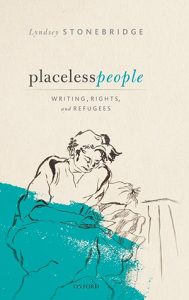Placeless People: Writing, Rights, and Refugees

Author: Lyndsey Stonebridge
Publisher: Oxford University Press
Year of Publication: 2022
Print Length: 320 pages
Genre: Non-Fiction / Arts & Humanities, Migration & Refugee Studies
Area: Palestine
People: Jews, Palestinian
Topic: Asylum & Asylum Seekers, Refugees & Forced Migration, Asylum & Refugee System, Exile & Exodus, Expulsion, Statelessness, Ethics & Morality, Writing, Imagination, Poetics, Human Rights, Humanism; Law, Jurisprudence, Legal Theory; Nation-Building & Nationhood, Politics & Power, Scholarship & Knowledge, Sovereignty
In 1944 the political philosopher and refugee, Hannah Arendt wrote: ‘Everywhere the word ‘exile’ which once had an undertone of almost sacred awe, now provokes the idea of something simultaneously suspicious and unfortunate.’ Today’s refugee ‘crisis’ has its origins in the political–and imaginative–history of the last century. Exiles from other places have often caused trouble for ideas about sovereignty, law and nationhood. But the meanings of exile changed dramatically in the twentieth century. This book shows just how profoundly the calamity of statelessness shaped modern literature and thought. For writers such as Hannah Arendt, Franz Kafka, W.H. Auden, George Orwell, Samuel Beckett, Simone Weil, among others, the outcasts of the twentieth century raised vital questions about sovereignty, humanism and the future of human rights. Placeless People argues that we urgently need to reconnect with the moral and political imagination of these first chroniclers of the placeless condition.
Table of Contents
Preface and Acknowledgements
List of Illustrations
Introduction: Placeless People: Writing, Rights and Refugees
PART ONE: READING STATELESSNESS
1. Reading Statelessness: Arendt’s Kafka
2. Hannah Arendt’s Message of Ill Tidings
PART TWO: PLACELESS PEOPLE
3. Orwell’s Jews
4. Weil’s Uprooted
5. Beckett’s Expelled
PART THREE: SANDS OF SORROW
6. Sands of Sorrow: Dorothy Thompson in Palestine
7. Statelessness and the Poetry of the Borderline: W.H. Auden and Yousif M. Qasmiyeh
Endnotes
Bibliography
General Index
Names Index

Lyndsey Stonebridge is Professor of Humanities and Human Rights at the University of Birmingham. Her work focuses on twentieth-century and contemporary literature, political theory, and history, Human Rights, and Refugee Studies, drawing on the interdisciplinary connections between literature, history, politics, law, and social policy. Her early work was concerned with the effects of modern violence on the mind in the twentieth and twenty-first centuries: The Destructive Element (1998), Reading Melanie Klein (1998) and The Writing of Anxiety (2007). Her more recent writing has focussed on the creative history of responses to that violence in two awarding-winning books: The Judicial Imagination: Writing after Nuremberg (2011), which won the British Academy Rose Mary Crawshay Prize, 2014, and Placeless People: Writing, Rights, and Refugees (2018), winner of the Modernist Studies Association Best Book Prize 2018. In 2020 she published a collection of essays, Writing and Righting: Literature in the Age of Human Rights (2020), which drew on her journalism and work with two major interdisciplinary research projects Refugee Hosts and Rights4Time.
Source: https://www.birmingham.ac.uk/staff/profiles/english/stonebridge-lyndsey
More from Lyndsey Stonebridge in this library, click here.
